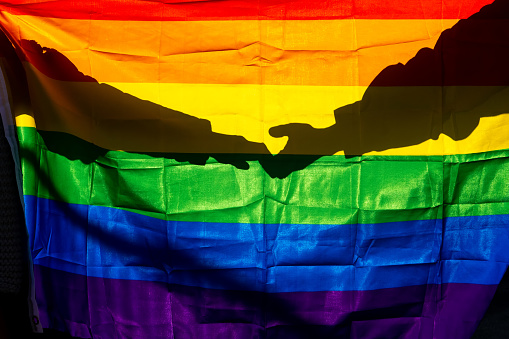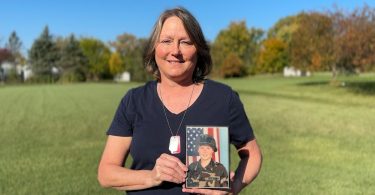The past year was a political gauntlet for LGBTQ North Carolinians, their families, allies and even their doctors. Newsline documented it through coverage of state legislation, the examination of its impact and North Carolina’s place in larger national trends.
North Carolina was caught up in an unprecedented wave of anti-LGBTQ legislationin 2022, with Republicans filing a raft of anti-LGBTQ bills that would restrict medical care for transgender youth, exclude them from school sports, require teachers to out LGBTQ students to their families, and ban any instruction or material mentioning LGBTQ people in kindergarten through third grade.
But GOP leaders didn’t bring those bills to a vote, deterred by Gov. Roy Cooper’s veto and Democrats’ ability to sustain it in the General Assembly.
With that math changed by Democratic losses in the 2022 elections, the legislative floodgates opened in 2023. All those bills became law.
1) Legislative assaults on the LGBTQ community
“This would have been my nightmare,” Alex Lounsbury, a young transgender man then a high school senior in Winston-Salem, told Newsline in February. “Being outed, not being able to speak my truth about who I really am in my own time, when I decided to. And to not be able to make a decision with my family and my doctors. I don’t see why it’s anybody else’s place to say, why they belong in that conversation.”
Alex Lounsbury (Courtesy photo)
From that story:
“For Lounsbury and many transgender youth, the two bills offer a perplexing insight into what Republican lawmakers believe to be the place of government in family and medical decisions.Under SB49, the so-called ‘Parents’ Bill of Rights,’ the place of parents is paramount in any discussion of gender, sexuality and identity. Its sponsors argue the government — in this case, through teachers and school administrators — has no place in conversations about a young person’s gender identity without them.
But under HB43 parents like Lounsbury’s, who support their transgender children and follow the standard of care prescribed by doctors and myriad medical associations, would see the government intervene to prevent any steps toward transition until they are 18.
These contradictory ideas about family versus government seem to be bridged by one overarching belief, Lounsbury said: the assumption that being transgender is dangerous, something to protect children against even if their families and doctors don’t share that view.
‘What they’re saying is the parents should have these conversations and make these decisions — unless they support you,’ Lounsbury said. ‘Then the government just makes the decision it wants them to. It’s only the parents who are against it whose rights matter.’”
During debate on various pieces of legislation, GOP lawmakers suggested more young people being open about being LGBTQ is the result of a dangerous “social contagion” and called gender transition “experimental,” likening it to forced sterilization and lobotomies. In fact, various types of medical gender transition have been in mainstream use for decades, during which studies have repeatedly shown it leads to better mental health outcomes for transgender youth, dramatically lower levels of depression and suicidal ideation. It’s broadly supported by the nation’s largest and most respected medical organizations, including the American Medical Association, the American Academy of Pediatrics, the American Psychiatric Association and the Endocrine Society.
In April, as part of heated hearings on a bill excluding transgender students from participating in sports that align with their gender identity, GOP lawmakers brought in Riley Gaines, a former All-American collegiate swimmer who has crisscrossed the country in the last year misrepresenting the dominance of transgender women in her sport.
From that story:
Gaines also appeared at the Conservative Political Action Conference (CPAC) with former President Donald Trump and in an ad for congressional hopeful Herschel Walker.
Thomas had clear biological advantages, Gaines said, and she felt humiliated by the experience of working so hard only to tie with Thomas. Thomas was given the single trophy and celebrated as a transgender athlete, Gaines said, while her ambitions were dashed.
“I felt betrayed and belittled,” Gaines said. “Like my efforts and sacrifices I had made had been reduced to a photo-op, to validate the identity and feelings of a male. My feelings didn’t matter.”
As the first openly transgender athlete to win an NCAA Division I national championship in any sport, Thomas became a target for criticism and the face of what conservatives said was a looming transgender takeover of women’s sports. But her actual record doesn’t show the dominant performance advantages her critics describe.
Riley Gaines, a former All-American collegiate swimmer, was in Raleigh to speak in favor of the bill. (Image: Screen capture from livestream)
Thomas won the NCAA women’s 500-yard freestyle competition in 2022. But her time — 4 minutes, 32.24 seconds — wasn’t a record-breaker. She was more than 9 seconds behind the record set by Katie Ledecky, a cisgender woman, in 2017. There were 27 all-time NCAA records broken in overall competition — all by cisgender women, including N.C. State’s own Katharine Berkoff. Just one of those cisgender women, the University of Virginia’s Kate Douglass, broke 18 records — including an unprecedented 3 American records in three different strokes.
2) Impact on LGBTQ youth, their families and medical providers
In October LGBTQ people, their families and doctors filed a federal lawsuit over legislation banning gender-affirming care for transgender youth. Among the plaintiffs is Dr. Riley Smith. Smith was one of a number of medical professionals Newsline highlighted in a November story, in collaboration with Qnotes Carolinas, examining the impact of the law.
From that story:
Laws banning gender-affirming care will have dire consequences for transgender youth,” said Riley, who is a plaintiff in the suit. “We do not need politicians in the exam rooms with us, overriding the decisions of families and their doctors or putting our professional licenses at risk for doing our jobs.“Instead, providers in North Carolina should be able to provide the highest quality, evidence-based care to their transgender patients, just like we do for our other patients,” Smith said.
Dr. Riley Smith, one of the plaintiffs in the federal lawsuit over transgender health care bans in North Carolina. (Image: Screen capture from online press conference)
For a variety of reasons, most transgender people still identify as trans and take steps to socially and — if they feel it necessary, medically — transition after puberty, said Katherine Croft, a nurse working in trans health care and board member of the LGBT Center of Raleigh. But for many, doing so earlier can make the process much easier, she said.
In addition to alleviating the psychological turmoil of experiencing a puberty that doesn’t align with their gender identity, those who are able to transition earlier can often opt for less treatment later, Croft said. That includes being able to avoid some gender-affirming surgery to alter aspects of the body changed in that puberty.
With trans young people now barred from gender-affirming care in North Carolina, Croft said, they will likely face greater mental health challenges, higher rates of suicide and a steeper climb when they do transition later in life.”
3) North Carolina as part of the national trend of anti-LGBTQ legislation, other challenges
In June, the Human Rights Campaign declared the first ever national state of emergency for LGBTQ people in the U.S. The move was inspired not just by a wave of anti-LGBTQ laws (of which North Carolina was a part) but a rash of threats and violence against individuals, groups and even multi-national corporations that support the community.
From Newsline’s October story on GOP attempts to punish not just LGBTQ people but their allies:A record number of anti-LGBTQ bills were filed and passed in states across the country this year. From criminalizing public drag shows and standard health care for transgender people to banning books and dictating school curricula, they collectively have the effect of marginalizing LGBTQ people and driving even their mention from the public square.As a new report from the Movement Advancement Project makes clear, this year’s raft of bills — in North Carolina and beyond — also target those supporting LGBTQ people, including doctors, teachers and corporations that appeal to or embrace the community.
“Americans support LGBTQ equality,” said Naomi Goldberg, deputy director and LGBTQ program director at MAP, in a statement released with the report this week. “Our opponents know this. That’s why they are working to create the false perception of lower support by scaring people into silence.
“Their attempts to bully, fine, and punish virtually anyone who supports LGBTQ people is just one tactic in their larger strategy,” Goldberg said. “As our report series makes clear, their ultimate goal is to keep LGBTQ people from being able to live openly and participate in daily life.”
Even as state laws targeted the LGBTQ community and its allies, individual North Carolina towns and cities continued to score high on LGBTQ equality measures. As Newsline reported in November,
From that story:
Towns and cities can also earn supplemental “flex points” for offering things like domestic partner benefits and youth bullying prevention policies and programs. While flex points can boost the total score for a municipality, none of the scores can exceed 100.
The index scored ten North Carolina municipalities this year — the same as the last two years. Two of those — Greensboro and Chapel Hill — received the top score of 100.
Raleigh went from a score of 85 last year to 78. Fayetteville, already the lowest scoring municipality ranked by the index, went from 41 last year to 34 this year.
Other towns and cities continued to make gains this year – some significant. Wilmington leaped 20 points from 46 last year to 66. Charlotte went from 86 last year to 95 while Cary went from 50 last year to 54.
While still scoring high, several municipalities saw their scores slip slightly this year. Carrboro, which the index scored at 100 last year, got a 95 this year. Durham’s score went down from 92 last year to 91 and Winston-Salem went from 92 to 90.
Carrboro’s slip from a score of 100 came as it lost points in several categories, with its “municipality as employer” rating going from 26 out of a possible 28 points to 21. Last year the town got a perfect score of 6 out of 6 points for “transgender healthcare benefits,” one of the criteria on which the municipality was graded as an employer. This year it got just one point.
Kelley Robinson, president of the Human Rights Campaign Foundation, said decreasing access to transgender health care is a trend the organization saw across the nation as it put together this year’s index.
Kelley Robinson, president of the Human Rights Campaign. (Photo: Human Rights Campaign)
“For the first time in the history of the MEI, fewer cities are providing transgender-inclusive health benefits to municipal employees,” Robinson said in a statement released with the report. “While the number of cities offering such benefits has increased—215 cities now provide packages inclusive of transgender health care—state legislation has substantially affected their enforceability and accessibility.”
The expansion of Medicaid in North Carolina this month should broaden access to sorely needed medical care, particularly for marginalized communities. As Newsline reported in December, in a story in collaboration with Qnotes Carolinas, Preexposure prophylaxis (PrEP) has been a game-changing innovation in the fight against HIV/AIDS. But barriers to access remain.
From that story:The FDA approved Truvada, the first commercially available PrEP pill, in 2012. Two years later, the Centers for Disease Control and Prevention approved guidelines that recommended its use by high-risk groups, especially men and transgender people who have sex with men.With daily use, Truvada is more than 99% effective. Its appeal was strong and adoption swift, especially in major cities. The CDC tracked PrEP usage among gay and bisexual men and found usage skyrocketed from just 6% in 2014 to 35% in just three years.
But not everyone was benefiting. Without insurance, a 30-day supply of PrEP could cost $2,000. Even insurance plans that covered the medication often required cost-sharing, co-pays or required patients to be responsible for the lab testing to access or stay on the drug.
The upshot: Far fewer lower-income people, particularly Black and Latino people, were able to get the drug.
That began to change in 2019, when the U.S. Preventive Services Task Force (USPSTF) issued a recommendation that would require nearly all private health care plans to cover PrEP without cost sharing no later than 2021, effectively making it free.
That same year, the FDA approved a second PrEP drug, Descovy. It was found to be as effective but with fewer effects on bone density and kidney function. Later that year, the FDA approved Apretude, the first injectable PrEP drug, which can be taken just once every two months. Later, doxycycline post-exposure prophylaxis (Doxy-Pep) would show great promise in dramatically reducing gonorrhea, chlamydia and syphilis infections in the same manner.
It seemed a real revolution was under way.
“I would joke that we should put it in the water,” Hoppe said. “Because every sexually active person, certainly every gay man and transgender woman and transgender man who is having sex with men should definitely be on PrEP. To me there’s no real question, because it’s so effective and the side effects are so low.”
Kody Kinsley, secretary of the NC Department of Health and Human Services. (Photo: DHHS)
But more than a decade after the first PrEP drug was approved, there are still barriers to and disparities in access. Low-income people and racial and ethnic minorities are still less likely to take the drugs, even as programs meant to expand access have proliferated. And conservative lawmakers are targeting funding for some of the most effective HIV prevention programs — including those that could make true universal access to PrEP a reality.
Kody Kinsley, North Carolina’s Secretary of Health and Human Services, calls PrEP a phenomenal tool that unfortunately still faces barriers to access including geography, affordability, politics and, unfortunately, stigma.
“Like every other virus it often preys on the vulnerable,” Kinsley told Newsline. “It preys on the people who are in rural communities, who don’t have access to health care, who are marginalized, and so bringing them into the fold of health care, bringing them to the fold of testing and support is step one, in trying to combat HIV.”







